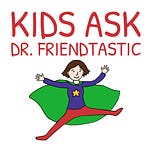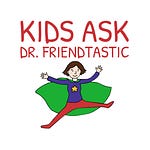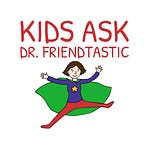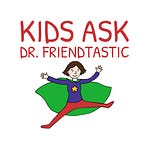Once again, a kid is asking a question that adults still grapple with. Lily wonders how to understand a friend who claims instant intimacy.
Scroll down for podcast TRANSCRIPT, DISCUSSION QUESTIONS, and how to submit YOUR CHILD’S QUESTION. You can always listen to podcast episodes right here in your email, where you’ll also receive transcripts and discussion questions, but please also subscribe and leave a review for Kids Ask Dr. Friendtastic on your favorite podcast app!
Would YOUR kid enjoy being featured on the podcast?
Adults, please use your smartphone's memo function or an audio app to record your child's question. Hold the phone close to your child's mouth to make sure the recording is clear. Have your child state:
their FIRST NAME (or another first name),
their AGE, and
a BRIEF QUESTION or concern about friendship. (Please do not include any friends' names.)
Submit the audio file at https://DrFriendtastic.com/submit. I’ll answer as many questions as I can. (Obviously, this is not psychotherapy, and it’s not for emergency situations.)
Think About It Questions to discuss with your child
In your own words, how would you describe the difference between attraction and closeness?
Have you ever had someone try to influence you by saying, “I’ll be your best friend…” or “I won’t be your best friend…”? What did they want you to do? How did you respond?
Have you ever met someone and immediately thought, “We’re going to be good friends!” Did you end up becoming close friends? Why or why not?
How could saying something like “No thanks” or “I’m not comfortable doing that” deepen your friendship?
Transcript
Welcome! I’m Dr. Eileen Kennedy-Moore, also known as Dr. Friendtastic. I’m an author and clinical psychologist based in Princeton, NJ.
Let’s listen to today’s question:
Hi, I’m Lily. I'm six, and my question is, why do people say that they're going to be your best friend if you just met them? Cuz you don't know if they're going to be mean, and I want to know why they say that.
Hi, Lily! Thanks for sending in your question!
I can tell that you already know a lot about friendship! You’re absolutely right that you can’t tell when you first meet someone whether they’re going to be mean or nice in the future because you just don’t know them very well!
What you can have when you first meet someone is attraction. Attraction means you feel drawn to someone. So, you might think, “Oh, they seem like a fun person to play with!” or “Wow, we seem to have a lot in common!” or “He seems nice!” or “She makes me laugh!” That initial attraction makes you want to spend more time with that person, and that might be the start of a close friendship.
Friendships are like flowers. It takes time and care for them to bloom and grow.
As you spend more time with kids and see them in different situations and different moods, you get to know each other better, and you have a better idea of what you can expect from them. With more experience being around them, you’ll get to know their habits. You’ll figure out what they like and don’t like. You’ll become better able to predict how they handle disagreements, what they do when they feel grumpy or excited or nervous, and how they respond when you’re happy or upset about something. These on-going experiences of being together will help determine whether your friendship stays casual, grows deeper, or fizzles out.
It may be that kids who talk about being best friends right away are expressing that initial attraction. So, their comment is a wish: They enjoyed meeting you, and they hope you will become close friends! That’s lovely! It means they feel your friendship is off to a good start. Time will tell whether that wish comes true, and you become close friends.
On the other hand, sometimes kids use the promise of close friendship as a bargaining tool. They might say, “I’ll be your best friend if you do this!” or “I won’t be your best friend if you do that!” That’s not so lovely!
That kind of bargaining isn’t part of a good friendship. You may want to try to understand why they want so much for you to do or not do whatever it is. But you definitely don’t want to let pressure or promises lead you to do something that’s not right or not right for you.
Be polite but firm and say, “No thanks” or “I’m not comfortable doing that” or “I’d rather do this, instead.” When you say clearly what you want or don’t want, you’re helping other kids get to know you better. That could deepen your friendship.
Good friends care about each others’ feelings. If certain other kids don’t seem to care about your feelings, and they keep pressuring you to do something you don’t want to do, well, maybe you’re not going to be close friends with them, at least not right now. Things could change in the future.
This has been Kids Ask Dr. Friendtastic. If you have a question about making and keeping friends that you’d like me to answer, go to DrFriendtastic.com, and click on the podcast tab to see how to submit your question.
Do you want to learn even more about friendship? Check out my funny and practical books for kids: Growing Friendships: A Kids’ Guide to Making and Keeping Friends, and my new book, Growing Feelings: A Kids’ Guide to Dealing with Emotions About Friends and Other Kids. They’re available through your library or wherever you buy books.
The Dr. Friendtastic newsletter and the Kids Ask Dr. Friendtastic podcast are for educational purposes only. They may or may not be relevant for your particular situation. I trust you to use your judgment about what’s right for your child and your family.













Share this post